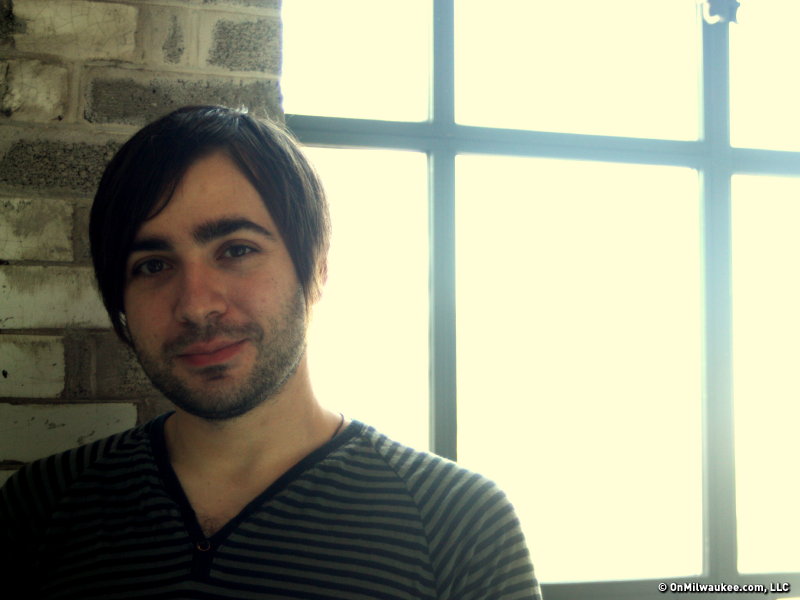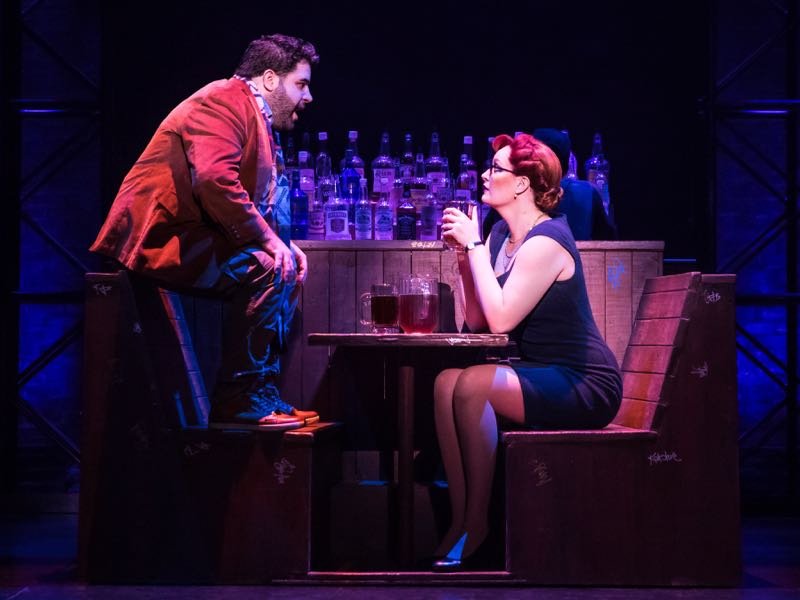When Mark Clements assumed artistic direction of The Milwaukee Repertory Theater in 2010, he made it clear that he wanted to bring a little more music to the Milwaukee stage.
It made some season ticket-holders nervous. Was The Rep going to turn into a cabaret?
"I think it’s important to just acknowledge that there are really great plays that are musicals," said Dan Kazemi, associate artist at The Rep and musical director of Stephen Sondheim’s "Assassins," which is currently running at the Quadracci Powerhouse.
"That’s what Mark wants to put up. You’re not going to come here to see ‘Hairspray.’ Mark has introduced programming that is dedicated to really pertinent and emotional and powerful and poignant musicals."
Some could argue that he couldn’t have done it without Kazemi. A friend and colleague of Clements', the 30-year-old Haverford College graduate has had a prolific career thus far on the East Coast, garnering Barrymore nominations for his work in "The Irish and How They Got That Way," "The World Goes Round," "The Flea and the Professor" and "Avenue X" (for which he won Outstanding Musical Direction).
Kazemi considers Milwaukee a breath of fresh air. The New Jersey native has been based in Philadelphia the past several years, and found it "kind of difficult to land a gig as a music director in the larger houses," he said.
"It feels like people get grandfathered in. So to get the call a couple of years ago from Mark to come and pioneer musicals here was just great."
Kazemi and Clements have collaborated on two Rep productions so far: "Next to Normal" and "Cabaret." Now they're making it a triple as they team up for "Assassins," the third musical to be featured on the Quadracci Powerhouse stage.
The provocative, incisively witty Sondheim musical first premiered in 1990 and its 2004 Broadway revival garnered several Tony Awards. The plot is centered on nine presidential assassins and delves into their personal characters, beliefs and motivations through a powerful score that is haunting at times and buoyant at others.
Presidential assassinations are uniquely stirring topics. The death of a commander in chief inspires acute public emotion, even 150 years after the fact. Woven into the musical's narrative are the sister issues of gun control, immigrant exploitation and the division of classes.
How does a musical hope to handle this cumbersome subject?
"Music is universal, visceral communication," Kazemi said. "When someone hears a big orchestra strike up a chord, you have an immediate response to it.
"I think this is one of Sondheim’s most powerful musicals. It is so pertinent and it has such important things to say about America and American society and the nature of people that we deem monsters."
Illustrating the nature of these "monsters" and giving context to their actions, said Kazemi, is something that can be accomplished more effusively with music.
"There is a huge sense of Americana in this score," he said. "That adds a huge element to this play, which really could be 20 small one-acts all strung together. The score has a through line that takes us historically through a journey of the assassinations and attempted assassinations. It’s deeply rooted in the fabric of American cultural music – from John Phillip Sousa marches to ‘Hail to the Chief,’ a theme that appears all over the show, even in ways you may not recognize."
A significant moment near the end of the play is when a clip of the Zapruder film of John F. Kennedy’s assassination is projected in slow motion against a giant onstage screen. The grainy video is profoundly effective – the president slumping forward, Secret Service Agent Clint Hill leaping onto the back of the car to shield the first lady as she reaches to retrieve a piece of her husband’s head that has been blown away.
It’s an iconic moment woven into the psyche of modern culture. "Hail to the Chief" plays slowly and mournfully in the background, and in the theater it seems that no one even breathes.
"Without that texture (of the music) I don’t think that Sondheim and John Weidman would have been able to create such a complicated layering of elements and themes," said Kazemi. "It has a really immediate way to pin up the moment. You know exactly what to feel and it paints just a very full story."
The original orchestration of "Assassins" called for only three musicians – drums, bass and piano.
"The original recording that people listen to never happened in the theater and wouldn’t be economical," said Kazemi, referring to a later incarnation of the score as interpreted by a 35-piece orchestra in a recording studio. "The revival in 2004 used a 13-piece orchestra and that’s the orchestration I got."
Kazemi faced a challenge in having only eight musicians budgeted. An orchestral reduction followed, which he organized.
"I had to make sure that everything is covered among us and that we can make a big enough sound with just eight people."
Kazemi conducts his mini-orchestra from the trap room beneath the Quadracci stage. The orchestra includes a bassist, two reed players, a trumpet player, a low brass player, a guitarist and a drummer. Kazemi is on keyboard and synthesizer. All musicians are called upon to do double or triple-duty with different instruments in order to produce the correct sound.
This is where the self-described "perfectionist" side of Kazemi takes control.
"We have to be perfect. Wrong notes aren’t allowed."
Kazemi has spent his whole life trying to keep away from the wrong notes. Music has been a longtime passion ever since he envied childhood friends’ ability to play the piano. He studied Musical Composition at Haverford College, minoring in Theater.
"There was zero musical theater on campus," he said. "I was studying with really brilliant, avant-garde composers, contemporary classical and really brilliant, avant-garde aficionados in my field. It was a totally unique experience."
Upon graduation, he made a beeline for the theater, starting in a production of "Cabaret" and other musicals.
"Performing and working under other music directors made me realize how much I wanted to do it myself and how good I could be," he said. "I have very well-developed ears and I can hear what the problems are. It got frustration to me to have to sit there and let someone else fix it. I want to fix it! I want to make it right."
He laughs at the characterization of himself as the hip wunderkind of the musical theater world.
"I mean, I just turned 30 less than a month ago," he said. "I’m happy to be that ‘young and hip’ musical director … but sometimes I walk into a rehearsal and people will be like, ‘Who’s that guy? What’s he here for? Is he in the cast?’ But I see myself as relatable and youthful and I think that’s an important approach. I’m very passionate about what I do."
The passion has definitely paid off in terms of nominations and awards. But Kazemi said it’s the recognition that artists really need.
"There are a lot of people out there doing really wonderful work and I appreciate the recognition more than the award itself," he said, referring to his 2009 Barrymore Award win for Outstanding Musical Direction.
And colleagues like Clements are what make a successful production.
"Mark just believes in whomever he believes in. He believes in the right answer and in people and in talent, regardless of age or who they are," said Kazemi. "We’ve always had a great time working together and are very much on the same page and trust each other’s opinion and are very honest with each other about what we hear. And we don’t have a major difficult emotional response to it. We’re making what we are making and we know what it has to be."
And what "Assassins" has to be – with Clements’ artistic eye and Kazemi’s musical prowess – is a portrait of American society through the eyes of those who seek to destroy it from the top down.
"We don’t accept the fact that these people are a part of our society and possibly sociologically our society is a big turning wheel that is pumping out these disenfranchised individuals somehow," he said, speaking to the representation of the assassins in the musical.
Last month, The Rep announced its installation of 19 Associate Artists, including Kazemi. The title cements his relationship to the musical theater community in Milwaukee, and he’s very grateful for that.
"By assembling a focused group of artists from all over the nation with a variety of expertise and experiences, The Rep gains much perspective," he wrote on The Rep’s website. "The Associate Artists also serve as ambassadors to the theater community at large…on a more personal note, the idea of having an artistic hub that values open discussion between its actors, designers, musicians and others is one that I have not found anywhere else in my travels as a professional artist."
Next up for Kazemi is the musical direction of The Rep’s "Blues in the Night," which runs from Oct. 19 through Dec. 23. After that he plans to move to New York to shop his original musical "The Tapioca Miracle" to investors and regional theaters.
For now, he is happy to help bring more music to the Cream City.
"A lot of houses get distracted by the shiny stuff," he said. "And while you’ll see really big, beautiful production values here at The Rep, it’s all for a reason. It’s all to tell a really important story."
Colleen Jurkiewicz is a Milwaukee native with a degree in English from the University of Wisconsin-Milwaukee, and she loves having a job where she learns something new about the Cream City every day. Her previous incarnations have included stints as a waitress, a barista, a writing tutor, a medical transcriptionist, a freelance journalist, and now this lovely gig at the best online magazine in Milwaukee.







